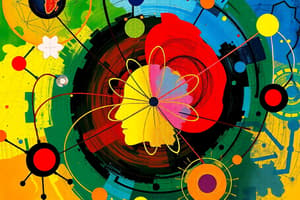Podcast
Questions and Answers
Which scientific attitude emphasizes the importance of questioning claims and examining evidence rigorously?
Which scientific attitude emphasizes the importance of questioning claims and examining evidence rigorously?
- Objectivity
- Skepticism (correct)
- Open-mindedness
- Curiosity
What is a key aspect of scientific communication that helps ensure the quality and reliability of research?
What is a key aspect of scientific communication that helps ensure the quality and reliability of research?
- Sharing findings only through private channels
- Peer review by experts in the field (correct)
- Ignoring conflicting evidence to maintain a consistent narrative
- Using complex jargon to impress other scientists
Which of the following is NOT a characteristic of a good scientific model?
Which of the following is NOT a characteristic of a good scientific model?
- It accurately reflects the phenomenon being studied
- It always perfectly matches reality in all aspects (correct)
- It simplifies complex concepts for easier understanding
- It can be easily replicated and tested by others
Why is objectivity crucial in scientific research?
Why is objectivity crucial in scientific research?
Which of the following best describes the concept of open-mindedness in science?
Which of the following best describes the concept of open-mindedness in science?
Which of the following is NOT a characteristic of the scientific method?
Which of the following is NOT a characteristic of the scientific method?
What is the primary role of a hypothesis in the scientific method?
What is the primary role of a hypothesis in the scientific method?
In a scientific experiment, what is the purpose of a controlled variable?
In a scientific experiment, what is the purpose of a controlled variable?
What is the difference between a scientific law and a scientific theory?
What is the difference between a scientific law and a scientific theory?
Which of the following scenarios demonstrates the scientific method in action?
Which of the following scenarios demonstrates the scientific method in action?
Why is it important for scientific knowledge to be constantly refined and updated?
Why is it important for scientific knowledge to be constantly refined and updated?
If the results of an experiment do not support the hypothesis, what is the appropriate next step in the scientific method?
If the results of an experiment do not support the hypothesis, what is the appropriate next step in the scientific method?
What is the relationship between independent and dependent variables in an experiment?
What is the relationship between independent and dependent variables in an experiment?
Flashcards
Models
Models
Representations or analogies to explain complex phenomena.
Curiosity
Curiosity
A fundamental driver in scientific research and questioning.
Skepticism
Skepticism
Willingness to question claims and evaluate evidence critically.
Objectivity
Objectivity
Signup and view all the flashcards
Scientific Communication
Scientific Communication
Signup and view all the flashcards
Science
Science
Signup and view all the flashcards
Scientific Method
Scientific Method
Signup and view all the flashcards
Observation
Observation
Signup and view all the flashcards
Hypothesis
Hypothesis
Signup and view all the flashcards
Prediction
Prediction
Signup and view all the flashcards
Theory
Theory
Signup and view all the flashcards
Law
Law
Signup and view all the flashcards
Variables
Variables
Signup and view all the flashcards
Study Notes
Introduction to Science
- Science is a systematic and organized body of knowledge explaining the natural world through observation, experimentation, and testable theories.
- It relies on empirical evidence, based on verifiable observations and measurements.
- Scientific knowledge evolves, refining and updating with new data and insights.
- Various branches exist, including physics, chemistry, biology, and Earth science.
Scientific Method
- The scientific method is a systematic approach to scientific inquiry, helping researchers gather knowledge and test hypotheses.
- Steps typically include:
- Observation: Noting a phenomenon needing explanation.
- Question: Asking a specific question about the observation.
- Hypothesis: A testable explanation (often "if...then..." format).
- Prediction: A measurable prediction following from the hypothesis.
- Experiment: Controlled testing of the hypothesis and prediction.
- Data Analysis: Evaluating data to see if it supports or refutes the hypothesis.
- Conclusion: Drawing conclusions based on data, recognizing results might support or reject the hypothesis, with both providing valuable information.
Key Concepts in Science
- Theory: A well-substantiated explanation based on a large body of evidence, incorporating facts, laws, inferences, and tested hypotheses. It's not a mere guess.
- Law: A descriptive statement or equation predicting specific natural phenomena under given conditions. It describes what happens, not necessarily why.
- Variables:
- Independent variables are manipulated to see their effect.
- Dependent variables change in response to the independent variable.
- Controlled variables are kept constant to isolate the effect of the independent variable.
- Models: Representations or analogies to illustrate complex phenomena, like diagrams of atomic structures.
Scientific Attitudes
- Curiosity: Drives the scientific quest, generating research questions and experiments.
- Skepticism: Questioning claims and critically evaluating evidence is essential to avoid bias.
- Objectivity: Avoiding personal opinions and biases in observation and data analysis.
- Open-mindedness: Accepting new information, potentially contradicting existing ideas.
Scientific Communication
- Sharing findings through publications and conferences advances science.
- Peer review ensures research validity and reliability.
- Clear, accurate communication, including proper data presentation, is crucial.
- Precise language and standardized methods enhance reliable results.
Studying That Suits You
Use AI to generate personalized quizzes and flashcards to suit your learning preferences.




